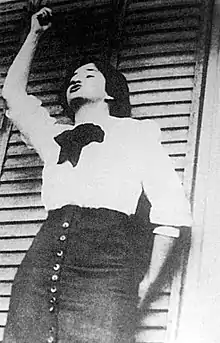Salvadora Medina Onrubia
Salvadora Medina Onrubia (pen name: Dr. Brea; March 23, 1894 – July 21, 1972) was an Argentine storyteller, poet, anarchist and feminist.[1][2][3]

Biography
Salvadora Medina Onrubia was born March 23, 1894, in La Plata, Buenos Aires Province. At the age of 15, she embraced the cause of the young anarchist from Russia, Simón Radowitzky,[4] After and began a friendship with him by correspondence.[5]
In February 1912, a month before Medina's 18th birthday, her first child, Carlos "Pitón", was born. In 1913, she began her literary activity in Gualeguay and in the Buenos Aires media, including at the magazine Fray Mocho. In the middle of that year, she moved from Entre Ríos to the City of Buenos Aires and began working for the anarchist newspaper, La Protesta. Soon after, she met Natalio Botana, a young journalist who collaborated with the magazine P.B.T. Natalio gave his surname to Salvadora's son and together they had three more children: Helvio Ildefonso, Jaime Alberto and Georgina Nicolasa. In 1919, Medina married Botana, after the birth of her youngest daughter. Botana had established the newspaper Crítica, which Medina directed between 1946 and 1951 after her husband's death.[6][7]
She was a contributor to La Protesta, Fray Mocho, and the newspaper, Crítica. In this publication, she wrote under the pseudonym "Dr. Brea".[8] She was the author of several dramatic pieces, such as Almafuerte, La solución (The solution), Las decentradas, and Un hombre y su vida (A man and his life). Her books of poetry include El misal de mi yoga (The Missal of My Yoga) and La rueca milagrosa (The Miraculous Spinning Wheel). She was the author of single novel, Akasha and two books of short stories, El libro humilde y doliente (The humble and suffering book) and El vaso intacto y otros cuentos (The intact glass and other stories). Medina was a promoter of children's theater for children.[8][9]
Medina died July 21, 1972, in Buenos Aires, leaving behind an unpublished book, Los mil claveles colorados (A thousand red carnations). The book was edited together with ¡Arroja la bomba! Salvadora Medina Onrubia y el feminismo anarco, by Vanina Escales.
Selected works
- Almafuerte
- La solución
- Las decentradas
- Un hombre y su vida
- El misal de mi yoga
- La rueca milagrosa
- Akasha
- El libro humilde y doliente
- El vaso intacto y otros cuentos
References
- Pigna, Felipe (19 January 2020). "La feminista de la roja cabellera". www.clarin.com (in Spanish). Retrieved 22 August 2021.
- Lerman, Gabriel (29 June 2020). "Una biografía de Salvadora Medina Onrubia que incluye el inédito "Mil claveles colorados" -- Vanina Escales hizo un notable retrato de la pionera feminista y anarquista". PAGINA12 (in Spanish). Retrieved 22 August 2021.
- Arnés, Laura (1 March 2017). "Yo, Salvadora, Soy mujer, deseo y fantaseo -- LA BIBLIOLES". PAGINA12 (in Spanish). Retrieved 22 August 2021.
- Soto, Moira (23 August 2017). "Entrañable celebración de Salvadora Medina Onrubia - LA NACION". La Nación (in Spanish). Retrieved 22 August 2021.
- López, Maira (28 October 2019). "Una muestra en clave feminista -- Será el 1 de noviembre". PAGINA12 (in Spanish). Retrieved 22 August 2021.
- ""Medina Onrubia fue muestra de un malestar de parte de la sociedad de su época"". Diario El Ciudadano y la Región (in European Spanish). 24 November 2019. Retrieved 22 August 2021.
- Treibel, Guadalupe (31 March 2017). "Ella que nació infinita -- Escenas". PAGINA12 (in Spanish). Retrieved 22 August 2021.
- "¡Arroja la bomba! de Vanina Escales - Marea Editorial". www.editorialmarea.com.ar (in Spanish). Retrieved 22 August 2021.
- De Vita, Pablo (27 April 2017). "Salvadora, la mujer detrás de la leyenda de rebelde roja cabellera - LA NACION". La Nación (in Spanish). Retrieved 22 August 2021.